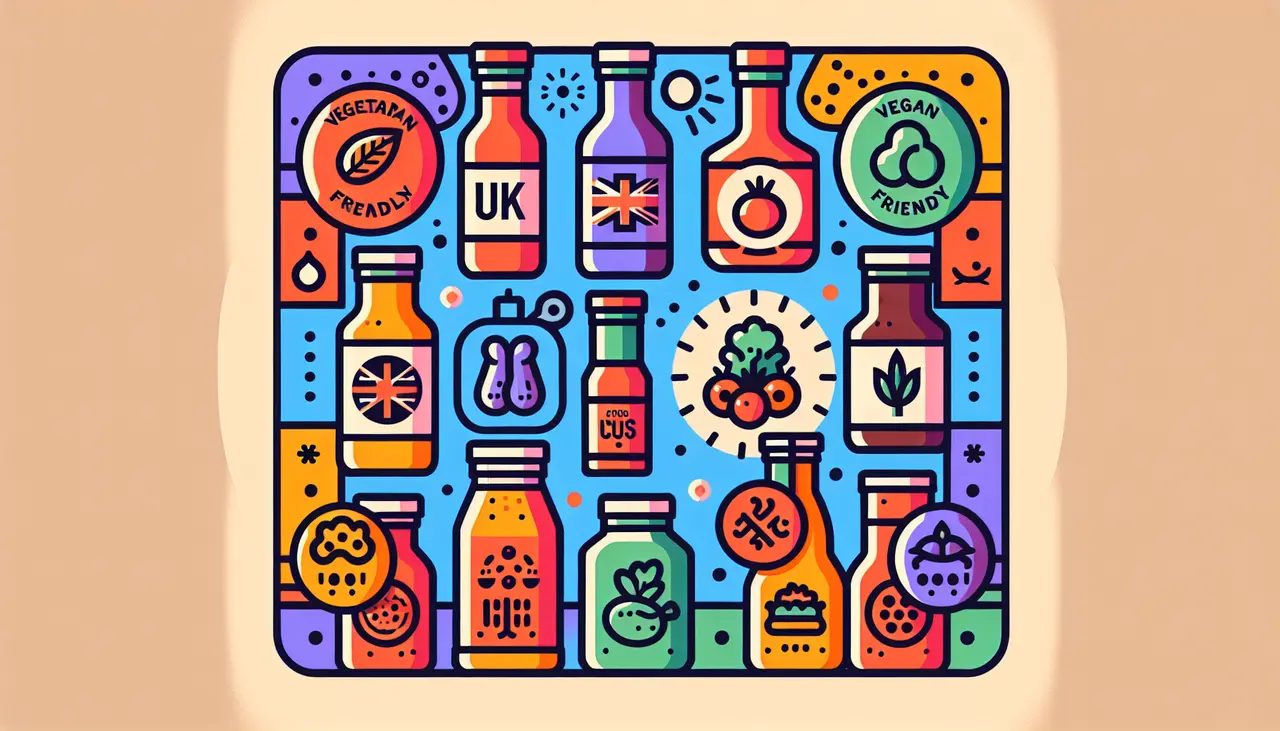Wondering if you can still enjoy your favourite UK sauces on a plant-based diet? Let’s dip into the details together!
Understanding Vegetarian and Vegan Diets
At the very heart, vegetarian diets avoid meat, while vegan diets take it a step further, excluding all animal products including dairy, eggs, and even honey. This lifestyle choice extends beyond just what’s on the plate – it also encompasses what’s in the bottle, jar, or packet in your kitchen cupboard.
The distinction between vegetarian and vegan dietary preferences is crucial when we explore the realm of condiments. Many sauces, at first glance, may seem suitable for both diets, but hidden ingredients derived from animals can make them off-limits for vegans.
Understanding these diet nuances is the first step in ensuring that the flavours enhancing your food align with your ethical and dietary choices.
Common Ingredients in UK Sauces
UK sauces boast an eclectic mix of ingredients, ranging from the basic tomato and vinegar to the more complex anchovies in Worcestershire sauce. This variety means a broad spectrum of flavours but also poses a challenge for vegetarians and vegans in identifying suitable options.
Ingredients such as gelatine (often used as a thickener in jellies and sweet sauces) and isinglass (a clarifying agent made from fish bladders, sometimes used in beer and wine but can also be found in clear sauces) are definite red flags for anyone on a plant-based diet.
Other lesser-known animal-derived ingredients include casein (a milk protein) and albumen (egg whites), making certain sauces less obvious in their non-compatibility with vegan and vegetarian diets.
Identifying Animal Products in Sauces
The key to identifying unsuitable sauces involves diligent label reading. Animal-derived ingredients can sometimes lurk under scientific or less-known names, making them easy to overlook.
Looking for certification logos such as the Vegan Society trademark can significantly simplify this process. These are reliable indicators that a product is safe for consumption for those avoiding animal products.
Furthermore, understanding certain terms can also be beneficial. For instance, ‘E120’ or carmine is a red dye made from insects and ‘E901’ is beeswax, both of which are not vegan.
How to Read Labels for Vegetarian and Vegan Friendliness
Start by looking at the allergen information, often boldly listed on packaging, as this can highlight hidden animal products such as milk and eggs. However, not all vegan ingredients will trigger allergen warnings, so proceed to the full ingredient list for a thorough check.
Labels specifically stating ‘suitable for vegetarians’ or ‘suitable for vegans’ are incredibly helpful, but it’s wise to conduct a quick review of the ingredients to confirm. Companies change their formulas, and certifications may lag behind new product formulations.
Technological advancements have also led to the development of apps that can scan product barcodes and instantly tell you if the product matches your dietary preferences, making it easier than ever to shop for suitable UK sauces.
Top Vegetarian and Vegan-Friendly UK Sauces
Among the plethora of options, several brands and types of sauces stand out for their commitment to vegetarian and vegan standards. Classic choices include tomato ketchup, most mustard varieties, and brown sauce, which are generally safe bets.
In recent years, there has been a surge in purpose-designed vegan sauces ranging from mayonnaise alternatives to vegan Worcestershire sauce, thanks to brands recognizing the growing demand for plant-based options.
For those with a taste for international cuisine, many soy sauce brands and certain chutneys also conform to vegan standards, offering robust flavors without the animal ingredients.
Making Your Own Vegetarian and Vegan UK Sauces
Creating your own sauces at home can be a fun and fulfilling way to ensure your condiments are completely vegetarian or vegan. The internet is awash with recipes ranging from simple salad dressings to more complex curry pastes and everything in between.
The beauty of homemade sauces is not just in their fresh flavors but also in the control it gives you over what goes into them, ensuring they are free from animal products and often, unwanted preservatives and additives.
Savoring UK Sauces the Vegetarian and Vegan Way
Navigating the world of condiments as a vegetarian or vegan doesn’t have to be a bland experience. With a bit more awareness and label-reading, you can still enjoy the rich tapestry of UK sauces, adding zest and flavour to your meals without compromising on your dietary choices.
